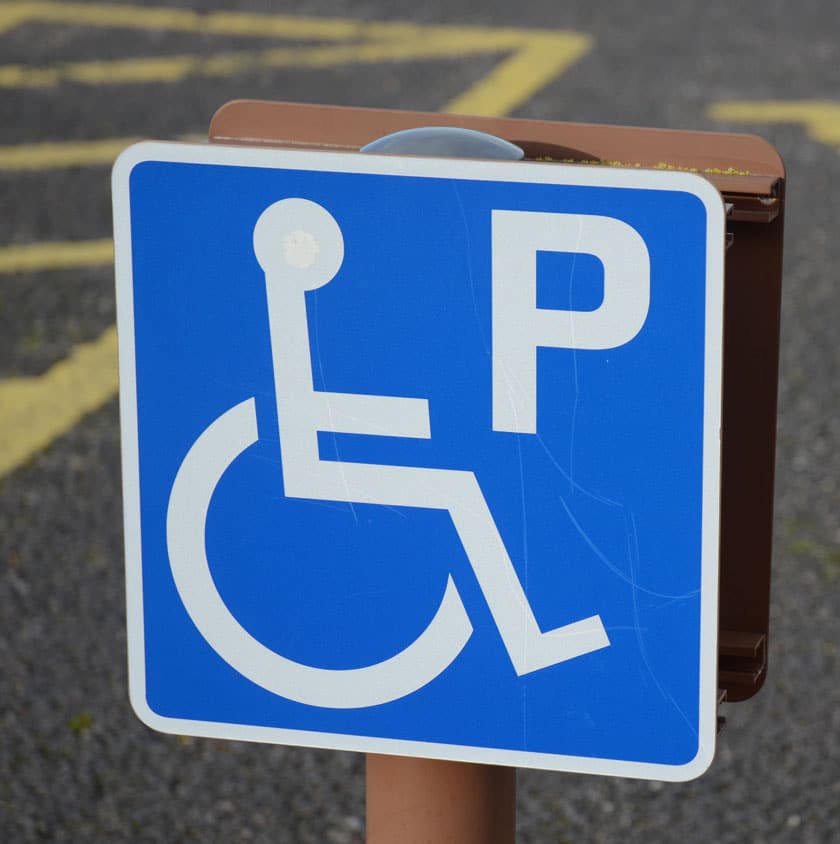
Disabled Driver Car Insurance
Compare Car Insurance Quotes For Disabled Drivers
- Compare 120+ insurers
- You could save up to £515*
- Find a great deal today

Compare insurance quotes from the UK’s leading diabled driver car insurers including:
Why Compare Disability Car Insurance At SimplyQuote.co.uk?
Finding the right car insurance as a disabled driver doesn’t have to be complicated. Whether you drive a standard car, an adapted vehicle, or a Motability car, ensuring you have the right policy gives you peace of mind on the road.
SimplyQuote, in partnership with Quotezone, helps disabled drivers compare quotes from leading UK insurers. In just a few minutes, you can access tailored policies that consider vehicle adaptations, mobility aids, and personal injury protection. Many insurers offer competitive rates for disabled drivers, and comparing quotes ensures you’re not overpaying while securing the best cover for your needs.
What Do You Need To Get A Quote?
When applying for car insurance, disabled drivers should be prepared to provide key details to ensure an accurate quote. Having this information ready can speed up the process:
- Personal Information – Full name, date of birth, and contact details.
- Driving Licence Details – Type of licence, driving history, and any past convictions.
- Vehicle Information – Make, model, registration number, and whether any modifications have been made.
- Usage Details – Estimated mileage, whether the car is used for commuting, personal, or business purposes, and overnight parking location.
- No Claims Bonus (NCB) – Proof of accumulated no-claims discounts.
- Adaptations and Modifications – Any modifications such as hand controls, wheelchair access, or steering aids should be declared.
Most insurers don’t charge extra for essential disability-related modifications. However, it’s important to ensure all adaptations are covered under your policy.

Why Do Disabled Drivers Need Car Insurance?
Disabled drivers require the same level of protection as any other motorist, but with additional considerations for vehicle adaptations and accessibility.
Legal Requirement
UK law requires all drivers to have at least Third-Party Only insurance to legally drive on public roads. Failing to do so can lead to fines, penalty points, or disqualification.
Financial Protection
Car insurance helps cover repair costs, medical expenses, and third-party claims in case of an accident. For disabled drivers who rely heavily on their vehicle for independence, the right policy ensures financial security in unexpected situations.
Cover for Adapted Vehicles
Many disabled drivers use modified vehicles with hand controls, wheelchair lifts, or steering aids. A specialist policy ensures these adaptations are covered against damage or theft, preventing unexpected repair costs.
Peace of Mind
Having reliable insurance means disabled drivers can confidently travel for work, medical appointments, or leisure without worrying about unexpected incidents. Some policies offer enhanced benefits such as priority roadside recovery for wheelchair-accessible vehicles (WAVs) and tailored replacement car options.
What Types of Car Insurance Are Available for Disabled Drivers?
Disabled drivers can choose from different types of policies to ensure their vehicle and any modifications are adequately covered.
Adapted Vehicle Insurance
For vehicles with hand controls, wheelchair lifts, or specialist steering modifications, a standard policy may not provide full protection. Choosing a specialist provider ensures these adaptations are covered in case of damage or theft.
Mobility Scheme Insurance
If you lease a car through the Motability Scheme, insurance is typically included as part of the agreement. However, if you own your adapted car, you’ll need private insurance to ensure full coverage.
Carer or Named Driver Cover
Many disabled drivers rely on carers or family members to drive their car. Specialist policies allow carers to be the main driver while keeping the disabled individual as the policyholder.
Pay-as-You-Go (PAYG) Insurance
If you drive infrequently, PAYG insurance charges based on mileage, which could help reduce costs for disabled drivers who only use their car occasionally.
Blue Badge Holder Insurance
Some insurers offer discounted insurance for Blue Badge holders, as they are often seen as lower-risk drivers. These policies may also provide enhanced cover for parking-related incidents.
What Levels of Car Insurance Cover Are Available for Disabled Drivers?
Third-Party Only (TPO)
This is the legal minimum level of cover in the UK. It protects against damage to other vehicles, property, or individuals if you cause an accident, but does not cover your own vehicle.
Third-Party, Fire & Theft (TPFT)
Includes everything in TPO but also covers fire damage and theft of your vehicle. It’s a good middle-ground option for those wanting additional protection without the full cost of comprehensive cover.
Fully Comprehensive
This is the highest level of cover, protecting against:
- Damage to your own vehicle, even if you’re at fault.
- Third-party damages, including other vehicles and property.
- Fire, theft, and vandalism.
- Extras like windscreen repairs and personal accident cover (varies by insurer).
Many disabled drivers find fully comprehensive policies are the best value, as they often cost less than Third-Party cover while offering superior protection.
What Optional Add-ons Are Available for Disabled Drivers?
In addition to selecting the right level of cover, disabled drivers can enhance their policy with optional extras. These add-ons provide additional protection and help cover unexpected costs.
Breakdown Cover
Provides roadside assistance, with some policies including specialist recovery for wheelchair-accessible or adapted vehicles.
Carer or Named Driver Cover
Ensures a carer, family member, or friend is insured to drive the vehicle when needed.
Courtesy Car Cover
Provides a replacement vehicle while yours is being repaired. Some policies offer adapted courtesy cars for disabled drivers.
No-Claims Bonus (NCB) Protection
Allows you to make a claim without losing your no-claims discount, helping to keep future premiums lower.
Legal Protection Cover
Covers legal expenses in case of disputes, uninsured losses, or accident-related claims.
Personal Accident Cover
Provides financial support for medical expenses or rehabilitation if you sustain a serious injury in an accident.
These add-ons can provide valuable peace of mind, but they increase premiums, so it’s important to choose only those that suit your specific needs.
*51% of consumers could save £515.24 on their Car Insurance. The saving was calculated by comparing the cheapest price found with the average of the next six cheapest prices quoted by insurance providers on Seopa Ltd’s insurance comparison website. This is based on representative cost savings from December 2024 data. The savings you could achieve are dependent on your individual circumstances and how you selected your current insurance supplier.
How Much Does Car Insurance Cost for Disabled Drivers?
Under the Equality Act 2010, insurers cannot charge higher premiums solely based on disability. However, factors such as vehicle type, location, driving history, and annual mileage still influence pricing.
As of December 2024, the median fully comprehensive car insurance premium in the UK was £574.58. Disabled drivers with lower annual mileage or a strong no-claims history may secure more competitive rates.
While some vehicle adaptations can increase costs, many insurers cover standard mobility modifications at no extra charge. To further reduce premiums, consider comparing multiple quotes, enhancing vehicle security, exploring telematics insurance options, or utilizing the Motability Scheme, which includes insurance in its package.
How To Compare Disabled Drivers Insurance At SimplyQuote.co.uk?
Comparing car insurance doesn’t have to be time-consuming. SimplyQuote makes it easy for disabled drivers to find the best deals from leading UK insurers.
- Enter Your Details – Age, driving history, and any medical conditions or vehicle adaptations.
- Select Cover Type – Choose Third-Party, TPFT, or Fully Comprehensive insurance.
- Add Named Drivers – If a carer or family member regularly drives your vehicle, they should be included in the policy.
- Consider Add-Ons – Look at extras like breakdown cover or No-Claims Bonus Protection.
- Compare Policies – Review quotes from insurers offering specialist cover for disabled drivers.
- Secure Your Policy – Apply online and get immediate cover.
Related Insurance
Frequently Asked Questions
Not automatically. However, some insurers recognise that disabled drivers tend to have a lower accident rate and drive fewer miles, which may lead to lower premiums. Comparing policies is the best way to secure an affordable deal.
Yes. Many insurers offer adapted vehicle insurance that covers modifications such as hand controls, wheelchair ramps, and steering aids. Always ensure adaptations are declared when applying for a policy.
Yes, but only if your condition affects your driving. The DVLA requires drivers to declare medical conditions that may impact their ability to drive safely. Failure to disclose this information could invalidate your insurance.
Yes. If you lease a car through the Motability Scheme, insurance is included in the package. However, if you own your adapted vehicle, you’ll need to arrange separate insurance.
Yes. Many insurers allow carers, family members, or personal assistants to be added as named drivers. This is useful for disabled drivers who share their vehicle with someone else.
Fully Comprehensive insurance is usually the best option, offering the most protection for both your car and third-party claims. It’s often cheaper than Third-Party Only policies.
While a Blue Badge itself doesn’t directly impact your premium, it may help if it allows you to park in a safer, more secure location, reducing the risk of theft or damage.
If you use your car for work-related travel (beyond commuting), you may need a business-use policy to stay fully covered. This applies to roles such as carers, support workers, or those who visit clients in their vehicle.
Yes, but standard courtesy cars may not be adapted. If you require a wheelchair-accessible courtesy car, check with your insurer before purchasing an add-on or selecting a policy that guarantees a suitable replacement vehicle.
Written by Chris Richards
Page last reviewed on 24th February 2025 by Chris Richards





